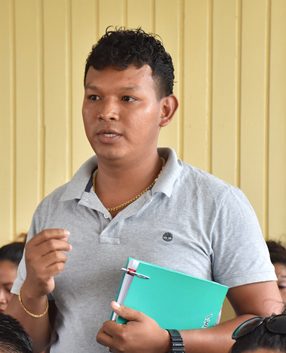With a July 15 deadline for Guyana to respond to the United Nations Committee on the Elimination of Racial Discrimination (UN CERD) over allegations of rights violations related to the indigenous community of Chinese Landing and the Wapichan people, the government has maintained silence.
(Editor’s note: An earlier version of this story had mistakenly stated the deadline as June 15.)
Stabroek News has reached out to Minister of Parliamentary Affairs and Governance Gail Teixeira for an update but up to press time she had not responded.
In a letter dated April 29, 2022, addressed to Chargé d’ Affaires of the Guyana mission at the United Nations Office in Geneva, Kerrlene Wills, Chair of UN CERD, Verene Shepherd highlighted the complaints that the Com-mittee received as well as Guyana’s non-response to various letters requesting information.
UN CERD’s Chair said, “…the Committee profoundly regrets the State party’s lack of reply to its letters of 17 May and 14 December 2018, regarding this situation.” It added “The Committee regrets that the State party has yet to submit its reply to the list of issues prior to submission of the fifteenth and sixteenth periodic reports that are overdue since November 2021. In this regard, the Committee requests the State party to submit the overdue reply as a matter of urgency.”
The Carib indigenous community of Chinese Landing in Region One (Barima-Waini) and the Wapichan nation of South Rupununi have complained about a number of violations under the Amerindian Act of 2006. They had submitted that these violations are being perpetuated by both the government and miners who are granted permission to operate on titled, customary and sacred lands within their communities.
To date, the government has not publicly addressed the letter nor signalled its intention to respond.
In its letter to the government, UN CERD highlighted that it considered information received under its early warning and urgent action procedure, related to the situation of the Chinese Landing and the Wapichan indigenous peoples at its 106th session.
In the case of Chinese Landing, the community is contending that the government granted a medium-scale mining concession to W Vieira in its titled lands without consulting or seeking the consent of the community. Chinese Landing had informed UN CERD that there has been an increase in unwanted mining which poses a risk to its traditional way of life and its environment. It is further alleged that a High Court dismissal, without a hearing, of a claim filed by the Chinese Landing indigenous community against the Guyana Geology and Mines Commission and Mr W. Vieira concerning the mining concession has also resulted in an upsurge of a series of incidents of intimidation and assaults on residents of the community, by miners and members of the Guyanese Police Force.
The government has been continually accused of breaching the free, prior and informed consent (FPIC) standard when granting mining concessions in indigenous communities and on customary lands.
Yesterday, Toshao of the Chinese Landing community, Orin Fernandes told Stabroek News that the situation continues to worsen with even more miners moving in and bypassing the laws. He added that the CERD letter was welcomed by the community and is hoping that the government responds to the recommendations and implements measures to combat the increasing rights violations.
New set
“Last week we had a new set of miners moving in and now we have another set coming in soon. The situation is worsening and the government has not said a word since the letter [from UN CERD] was released. We did not hear anything from the government as yet and we are hoping that they can at least address the issue we face here because this mining thing is really destroying our way of life,” he said.
Fernandes said that the Village Council has distributed copies of the letter to members of the community so that they can be apprised of what is going on.
Dealing with the allegations from the Wapichan nation, the UN CERD said that it is related to mining projects on Marudi Mountain and its impact on Wapichan indigenous peoples. The letter stated that the Committee received, on 17 November 2021, information that the Government of Guyana concluded an agreement with the company Romanex Guyana, Aurous and the Rupununi Miners Association allowing for the expansion of mining activities at Marudi Mountain, without consulting and seeking the consent of the Wapichan indigenous peoples. It is alleged that the mining activities at Marudi Mountain, a sacred area for the Wapichan people and also critically important as several rivers originate in this zone, pose an imminent and grave threat to the cultural heritage and livelihood of the Wapichan indigenous peoples.
The UN CERD also reminded Guyana of its recommendations in 2006 and reiterated its concerns and recommendations contained in the letters sent on 17 May and 14 December 2018, under its early warning and urgent action procedure.
On December 14, 2018, the Committee urged the government to consider revoking the draft Environmental and Social Impact Assessment for the Marudi mining projects; conduct an environmental and social impact assessment with the full participation of all indigenous peoples affected by the mining project on Marudi Mountain; and consider the suspension of the mining project on Marudi Mountain until free, prior and informed consent (FPIC) is granted by the Wapichan indigenous people following the full and adequate discharge of the duty to consult.
UN CERD gave the government until July 15, 2022, to address the allegations of rights violation against the Wapichan Nation and Chinese Landing. It identified a number of areas for the government to take measures on.
These include: Consider suspending or revoking the mining concessions that affect the lands, territories or resources of the Chinese Landing and the Wapichan indigenous peoples until FPIC is granted by these indigenous peoples; refrain from approving projects and granting mining permits or concessions within the lands of indigenous peoples, whether titled or not; ensure that Indigenous Peoples have access to effective and prompt judicial and other remedies to seek protection for their rights; prevent and investigate incidents of threats and violence against residents of the Chinese Landing indigenous community by miners and by members of the Guyanese Police Force; incorporate the principle of FPIC consent in domestic legislation, including by amending the Amerindian Act of 2006, with indigenous peoples’ participation, and to fully and adequately guarantee the right to consultation of indigenous peoples; and Consider ratifying ILO Indigenous and Tribal Peoples Convention (No. 169).








